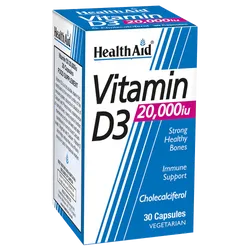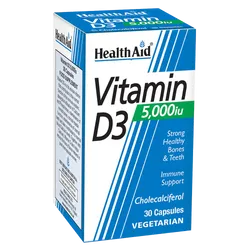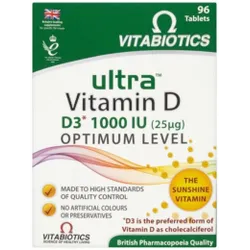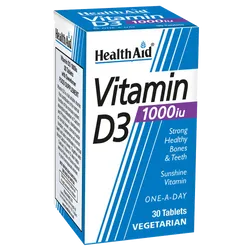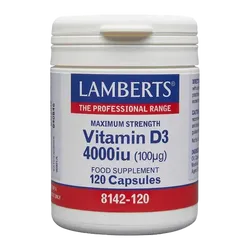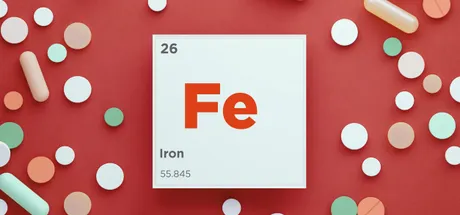
The Health Benefits of Vitamin D: Bones, Immunity & Daily Wellbeing

Vitamin D — often called the "sunshine vitamin" — is one of the most essential nutrients for maintaining good health. While your body can produce Vitamin D naturally through exposure to sunlight, many people still struggle to maintain sufficient levels, especially in northern climates like the UK where sunlight is limited for much of the year.
In this guide, we’ll explore the scientifically backed benefits of Vitamin D, highlight EU-approved health claims, and examine how certain medications may impact your Vitamin D levels.
The Benefits of Vitamin D
-
Supports calcium and phosphorus absorption
Vitamin D allows your body to absorb calcium and phosphorus efficiently, both of which are critical for the structure of your bones and teeth.
-
Maintains normal blood calcium levels
By helping to regulate blood calcium, Vitamin D ensures your nervous system, muscles, and heart all function correctly.
-
Promotes bone health
Adequate Vitamin D reduces the risk of bone weakness, fractures, and diseases like osteoporosis.
-
Aids muscle function
Strong muscles aren’t just important for athletic performance — Vitamin D helps maintain balance and prevents falls, particularly in older adults.
-
Supports dental health
Vitamin D ensures teeth stay strong by helping to deliver the minerals they need.
-
Boosts immune function
Vitamin D helps regulate your immune system, enhancing your body’s ability to fight off infections and illnesses.
-
Involved in cell division
Vitamin D plays a role in the process of cell division, helping your body repair tissues and maintain healthy skin and organs.
EU-Approved Health Claims for Vitamin D — And Why They Matter
The European Food Safety Authority (EFSA) has reviewed extensive scientific evidence to approve these official claims, which may appear on foods and supplements sold in the UK and EU:
-
Contributes to normal absorption/utilisation of calcium and phosphorus
Why it matters: Calcium and phosphorus are essential for strong bones, teeth, and skeletal structure. Without Vitamin D, your body cannot absorb these minerals efficiently, no matter how much you consume. This role is crucial for preventing bone diseases like rickets in children and osteomalacia in adults.
-
Contributes to normal blood calcium levels
Why it matters: Calcium plays a central role in nerve function, muscle contraction, blood clotting, and heart rhythm. Vitamin D ensures these calcium levels remain balanced, preventing serious complications such as muscle spasms or abnormal heart function.
-
Contributes to the maintenance of normal bones
Why it matters: Your bones continuously rebuild themselves. Vitamin D supports this renewal process by regulating bone mineral density and reducing the risk of fractures and osteoporosis — particularly in older adults and postmenopausal women.
-
Contributes to the maintenance of normal muscle function
Why it matters: Muscle cells contain Vitamin D receptors that help regulate muscle strength and coordination. Deficiency is associated with muscle weakness, pain, and an increased risk of falls — particularly dangerous for elderly individuals.
-
Contributes to the maintenance of normal teeth
Why it matters: Vitamin D aids the mineralisation of teeth, keeping enamel strong and reducing the risk of decay and gum disease. It also supports proper tooth development in children.
-
Contributes to the normal function of the immune system
Why it matters: Vitamin D helps regulate the immune response, improving the body's ability to fight off infections. Research links adequate Vitamin D levels with reduced risk of respiratory infections and faster recovery from illness.
-
Has a role in the process of cell division
Why it matters: Tissue repair and skin renewal depend on healthy cell division. Vitamin D supports proper cell replication, helping to maintain organ health, wound healing, and long-term wellbeing.
Sources of Vitamin D
- Sun exposure: The primary natural source, but often insufficient in the UK.
- Diet: Oily fish (salmon, sardines, mackerel), egg yolks, and fortified foods like milk, cereals, and spreads.
- Supplements: Typically 10–25 μg (400–1000 IU) per day depending on individual needs. The NHS recommends 10 μg daily for adults and children over one year old during autumn and winter months.
Medicines That May Reduce Vitamin D Levels
Certain commonly prescribed medicines can interfere with Vitamin D absorption or metabolism, increasing your risk of deficiency:
| Medication | How it affects Vitamin D |
|---|---|
| Orlistat (weight loss treatment) | Reduces fat absorption, which lowers uptake of fat-soluble vitamins like Vitamin D |
| Statins (e.g. atorvastatin, simvastatin) | May compete for liver enzymes involved in Vitamin D activation |
| Corticosteroids (e.g. prednisolone, dexamethasone) | Reduce Vitamin D metabolism, increasing risk of bone loss |
| Thiazide diuretics (e.g. bendroflumethiazide) | May interact with calcium regulation when combined with Vitamin D |
| Bile acid sequestrants (e.g. cholestyramine, colestipol) | Bind fat-soluble vitamins in the gut, lowering Vitamin D absorption |
| Anticonvulsants (e.g. phenytoin, carbamazepine, phenobarbital) | Speed up Vitamin D breakdown via liver enzyme induction |
| Others (e.g. digoxin, diltiazem, mineral oil) | May impair absorption or alter calcium balance |
If you take any of these medications long-term, speak with your pharmacist or GP about monitoring your Vitamin D levels.
Testing for Vitamin D
Home Tests are available that can check the levels of Vitamin D and give a good idea if it would be beneficial to supplement your Vitamin D intake,
Newfoundland Vitamin D At home test
Summary
Vitamin D plays a vital role in many aspects of human health — from bone strength and muscle function to immunity and cellular repair. These scientifically validated EU-approved claims highlight its importance at every stage of life.
However, many people — especially in northern climates like the UK — remain deficient due to low sun exposure, limited dietary intake, and interactions with certain medications. Reviewing your individual risk and considering supplementation may help you maintain optimal Vitamin D levels for lifelong health.
FAQs
- What is Vitamin D and why do I need it?
- How much Vitamin D does an adult need daily?
- What are common symptoms of Vitamin D deficiency?
- Who is most at risk of a deficiency?
- How can I safely increase my Vitamin D levels?
- Can you get too much Vitamin D?
- How is Vitamin D deficiency diagnosed?
- What types of Vitamin D are there?
- When should I take Vitamin D supplements?
What is Vitamin D and why do I need it?
Vitamin D is a fat-soluble vitamin and hormone essential for regulating calcium and phosphorus levels—key to healthy bones, teeth, and muscles. It also supports immune defence and cellular repair.
How much Vitamin D does an adult need daily?
- Adults (19–70 years): 600 IU (15 µg) daily
- Adults over 70: 800 IU (20 µg) daily
- UK public health advice: 400 IU (10 µg) daily during autumn/winter
What are common symptoms of Vitamin D deficiency?
- Persistent fatigue, bone pain, muscle weakness or cramps
- Increased susceptibility to infections
- Mood changes, hair loss, slow wound healing
Who is most at risk of a deficiency?
- Older adults (reduced skin synthesis)
- Individuals with darker skin or those exposed to little sunlight
- People with malabsorption conditions (e.g., Crohn’s, coeliac)
- Those on medications affecting Vitamin D (e.g., corticosteroids, anticonvulsants)
How can I safely increase my Vitamin D levels?
- Sunlight: 15–20 minutes daily during spring/summer in the UK
- Diet: Eat oily fish, egg yolks, UV-exposed mushrooms, fortified dairy or cereals
- Supplements: Vitamin D3 is most effective. Recommended doses range from 400–1000 IU daily, depending on need
Can you get too much Vitamin D?
Yes. Overdosing (e.g., over 4,000 IU/day) may cause high calcium levels, kidney stones, or heart issues. Stick to recommended limits unless medically advised.
How is Vitamin D deficiency diagnosed?
A blood test measuring 25-hydroxyvitamin D assesses levels. Many experts aim for 30–50 ng/mL (75–125 nmol/L) as optimal.
What types of Vitamin D are there?
- D3 (cholecalciferol)
- D2 (ergocalciferol)
When should I take Vitamin D supplements?
You can take Vitamin D at any time of day — morning or with a meal may improve absorption. Some combine it with vitamin K2 and magnesium for optimal calcium balance.
Published 9th June 2025 by

Allan Green
Registered Pharmacist & Head of E-commerce
Allan has been a Registered Pharmacist for 25+ years
He specializes in Ecommerce and Over the Counter medicines.
He is a Registered Pharmacist, who studied at University of Bradford.
He has been with Weldricks since 2006, starting as a branch manager before moving into area management and deputy superintendent roles.
His current responsibilities include web development, marketing, content, customer service and web operations teams.
Related Products
-
Valupak Vitamin D3 1000iu tablet Pack of 60 £1.15 save £0.10
-
HealthAid Vitamin D3 20,000iu Vegicaps 30 Capsules £13.79 save £4.20
-
HealthAid Vitamin D3 5,000iu Vegicaps 30 Capsules £6.99 save £2.00
-
Vitabiotics Ultra Vitamin D3 Tablets Pack of 96 £5.99 save £0.16
-
HealthAid Vitamin D3 1000iu Tablets Pack of 120 £9.19 save £2.80
-
Lamberts Vitamin D3 4000iu Capsules Pack of 120 £11.99 save £4.51
-
VOOST Vitamin D 25ug Effervescent Tablets Pack of 20 £4.39 save £1.10
-
Suresign Vitamin D Test £5.45 save £7.54
-
Lamberts Vitamin D (D3 form) 1000iu Capsules Pack of 120 £10.29 save £3.21
-
MinaKIDS D3 & K2 Drops 60ml £8.38 save £6.61
-
Bio-Kult Infantis Sachets Pack of 16 £10.29 save £2.69

